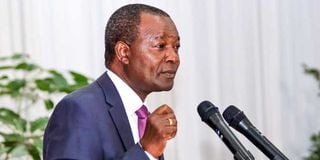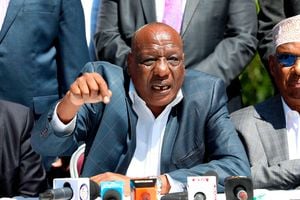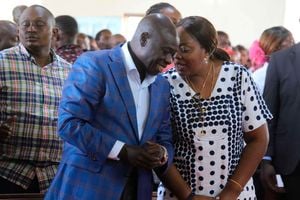
National Treasury and Economic Planning Cabinet Secretary Njuguna Ndung’u.
The revival of the emotive debate over whether resources should be shared on the basis of population alone or on geographical size has reignited past divisions in the country.
From the failed pre-independence push for majimbo (a form of federalism) and Sessional Paper No. 10 of 1965 on African Socialism, to the advent of devolution under the 2010 Constitution, and the big fights every year over what should go to the counties, Kenya has had a never-ending debate on how to share the national cake.
The 1965 policy paper advanced the notion that to make the economy grow as a whole as fast as possible, development money should be invested where it will yield the largest increase in net output.
This approach favoured the development of areas having abundant natural resources, good land and rainfall, transport and power facilities.
This system has been blamed for marginalisation of Arid and Semi-Arid Lands (ASALs) while areas with good climatic conditions that already enjoyed good infrastructure after colonists settled there, being favoured.
The current “one man, one vote, one shilling” debate ignited by Deputy President Rigathi Gachagua appears to follow the same script — richer more endowed regions like Mt Kenya with the highest population density want the sharing of the national cake based on their biggest advantage, numbers.
Disadvantaged counties
On the other hand, poorer sparsely populated counties, which occupy nearly 80 percent of Kenya’s land mass in North Rift, North-Eastern, a chunk of Eastern and parts of the Coast region, argue that such a formula will be a disadvantage them yet they need a lot more resources.
A poignant example often given by the “one square kilometre, one shilling” proponents is North Horr Constituency, which at 38,953 square kilometres, is larger than Rwanda and bigger than Western, Nyanza, Central and Nairobi regions combined.
After independence, the unfair distribution of resources exposed the two major political parties at independence — Kanu and Kadu — which had competing interests on what was good for Kenya. Kanu advocated for a unitary State and Kadu majimboism (federalism).
In 2010, Kenya made a significant step with the enactment of a new Constitution that created counties and which were to get at least 15 percent of the national revenue.
“The unitary system of government favoured people with strong representation in Parliament. Areas like Upper Eastern, North Eastern, Lower Eastern and the Coast suffered,” Moi University lecturer Nyaga Kindiki said.
He added that the push for “one man, one vote, one shilling” formula could return the country to the system where some areas were favoured.
“This is a back and forth debate. Different parameters, and not population alone should be used in resource allocation.
"This will prevent a scenario like in the past where areas in which missionaries and Europeans settled, and had similar climatic conditions like their home countries and developed infrastructure including schools and hospitals, were favoured,” the professor of International Education and Policy said.
“If you give the money depending on the size of the land alone, people with a huge population will be disadvantaged. The Equalisation Fund helps areas that were marginalised for long in terms of development catch up,” he added, noting that poverty levels should also determine resource allocation.
Division
Prof Kindiki warned that the heated debate over funds allocation could divide Kenyans along the lines of the rich and more educated, who mainly back sharing of resources depending on population and the poor and less educated who are clamouring for use of land size.
“President William Ruto should listen to both sides, go slow and try and back the majority because they support the government. However, he should still establish a special fund to supplement allocations for roads, health, education and major State social programmes in disadvantaged areas to ensure fairness and equality,” the don said.
He explained that the debate in Mt Kenya, which he termed as politically motivated with an eye on the 2027 and 2032 elections, could spill over to other populous counties if its proponents are not curtailed.
“At independence, Kanu won because it rejected majimboism but in the early 1990s, people agitated for equal sharing of resources and representation. We are now enjoying the new Constitution because of majimboism as it gave resources to the people,” he said.
BBI
Although the Building Bridges Initiative spearheaded by retired President Uhuru Kenyatta and opposition chief Raila Odinga pushed for sharing of funds based on population and “other good things”, Prof Kindiki averred that it flopped because it favoured the rich rather than the “hustlers”.
He claimed that it was geared towards creating positions for powerful individuals and also sought to ensure that Mr Kenyatta remained in power through the backdoor, while blocking Dr Ruto’s path to State House with “mischievous clauses”.
The don said that by Mr Gachagua pushing for the “one man, one vote, one shilling” formula, he could be campaigning for use of population in allocation of funds, and following his alleged isolation in Kenya Kwanza regime, win the hearts of Mt Kenya residents and build on that as a platform to clinch the presidency in 2032.
Prof Kindiki said that Mr Gachagua could also be out to stamp his authority as youthful politicians from Mt Kenya region jostle to replace him as Ruto’s running mate in 2027.
KRA parameters
The Commission of Revenue Allocation uses population, poverty index, land area, basic equal share and fiscal responsibility as key parameters in sharing of revenue to counties.
Dr Samuel Nyandemo, an economist and senior lecturer at the University of Nairobi said the 2010 Constitution is clear that revenue allocation should put into consideration the marginalisation of regions and bring them at par with the rest of the country.
“When the resource allocation formula was floated in the BBI, Gachagua opposed it. What has changed now that he is supporting it? He should be honest with Kenyans,” Dr Nyandemo said.
He, however, noted that proposals to share revenue based on population was logical since “resources are utilised by human beings and not land mass.
ASAL region opposing
Former governor Ali Korane, ex-Senate Speaker Ekwee Ethuro and other leaders from ASAL regions have opposed Mr Gachagua’s proposal.
Mandera Senator Ali Roba, who is also the UDM party leader, said Mr Gachagua’s “one man one shilling” campaign presents significant risks to Kenya’s national unity and development”, adding that areas such as Kiambu with high population should ideally be allocated more resources.
“We can revert to the one man, one vote, one shilling perhaps in the next 15 years or so. By then, the marginalised areas will have come to the same level with other parts of the country,” Dr Nyandemo said.
The Commission on Revenue Allocation, which is mandated to ensure fairness and equitable distribution of resources, also warned that allocation of funds based on population alone was impractical.
“From a professional point of view, the one-man-one vote-one shilling is just but one parameter and you cannot use it to allocate resources. We are not going to consider that because it never came from any county,” Commissioner Hadija Juma said, adding that if implemented, some Kenyans will be left behind.
Uasin Gishu Governor Jonathan Bii said the interests of large scale farmers who cultivate vast tracts of land to provide food for the rest of Kenyans will be affected.
Leaders from Arid and Semi-Arid Lands have also rubbished Mr Gachagua’s push and instead vouched for One-Man-One-Vote-One-Kilometre saying pastoralists play a key role to the country’s politics and economy.
“One-man, one-vote, one-shilling is a weak formula for resource allocation that neither supports the existing framework for equitable resource sharing nor addresses the current economic challenges,” the Asal counties leaders led by former governor Ali Korane and former Senate Speaker Ekwee Ethuro said in a statement.
The narrative by Central Kenya leaders, they warned, perpetuates ethnic jingoism and promotes unwarranted denigration of certain communities.
Mandera Senator Ali Roba who is also the UDM Party Leader said Mr Gachagua’s move to position himself as Mt Kenya region leader and championing the one-man, one-vote, one shilling policy presents significant risks to Kenya’s national unity and development.
Mr Gachagua kick-started the emotive debate during a church event in Embu some weeks ago, insisting that the country's resources be should be shared in accordance with the population.
He was emphatic that resources were about people but not landmass and advocated for the review of the formula so that residents from the populated areas such as Mount Kenya could benefit.
"I' m a proponent of one man, one vote, one shilling and I have no apology to make," he said.
"The whole issue of resources is about people and fairness should be exercised when it comes to sharing revenue," he said.
He lamented that it was unfair that Constituency like Ruiru which has a population of more than 800,000 people receive National Government Constituency Development Fund NG-CDF) funds equal to a small Constituency outside Mount Kenya region which has a handful people.
" The more you are ,the more taxes you pay. And it goes without saying, the more taxes you pay when it comes to sharing of revenue, you should benefit more," he said Mr Gachagua said equality should be observed in the allocation of the national cake.
"We want equality and equity, we want fairness in sharing of revenue," he said.
He was responding to remarks by Embu Governor Cecily Mbarire that the counties of Mt Kenya region are being given a raw deal in allocation of resources.
But Public Service Cabinet Secretary Moses Kuria has poured cold water on Mr Gachagua’s cries saying Central Kenya controlled nearly half of top government positions who could easily change the resource allocation formula if they wanted.
In a past writing, presidential advisor David Ndii had warned that the push by some elements in President Uhuru Kenyatta regime for allocation of resources based on population alone was uncalled for and that the alternative was for the country to go for a full federal system of government.
“If Kenyatta and his Kikuyu supremacist cabal feel it is intolerable, there is always the alternative of a full federal system. Mombasa and Lamu get to keep their ports.
"Turkana gets to develop its oil resources. Marsabit gets to charge for its wind resources. The Tsavo National Park reverts to Taita-Taveta County,” Mr Ndii wrote.
He added: “Tyranny of numbers, domination of the weak by the strong, and ethnic superiority complexes, this is not an option. Without a commitment to equitable development, there is no social contract, which is to say that, sooner or later, there will be no Kenya.”











